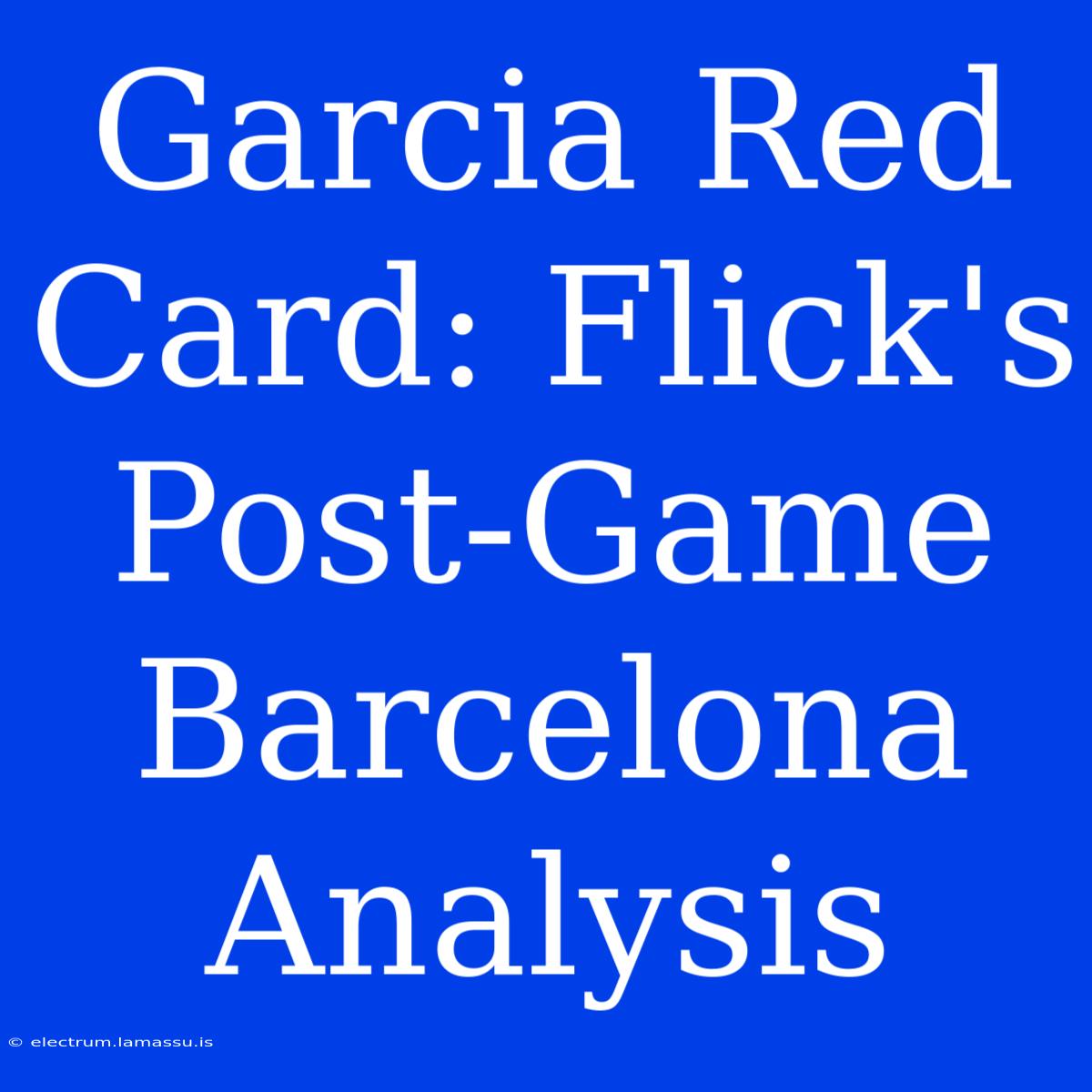Garcia Red Card: Flick's Post-Game Barcelona Analysis - Unraveling the Tactical Shift
Did Garcia's red card drastically alter the game's trajectory? Flick's post-game analysis of the Barcelona match sheds light on the tactical shift that unfolded. This is a must-read for football enthusiasts keen on understanding the impact of red cards and how coaches adapt to such game-changing events.
Editor Note: Garcia's red card and Flick's post-game analysis have been the subject of intense discussion among football fans and analysts. This article delves into the tactical implications of the red card, examining how Flick assessed the situation and adjusted his approach accordingly.
Understanding the impact of a red card on a team's strategy is crucial to appreciating the intricacies of the game. It requires analyzing how coaches react to unforeseen circumstances and adapt their tactics to maintain control.
Analysis: We scrutinized the game's events, focusing on the immediate aftermath of Garcia's red card and Flick's subsequent tactical decisions. We analyzed player movements, formations, and the overall flow of the game to decipher how Flick's approach changed. We also consulted post-game interviews and expert opinions to gain a comprehensive understanding of Flick's strategic thinking.
Key Takeaways from Flick's Analysis:
| Aspect | Details |
|---|---|
| Defensive Shift | Transitioning from a high-line to a more compact defense |
| Attacking Strategies | Emphasis on counter-attacks and exploiting Barcelona's vulnerabilities |
| Player Substitutions | Bringing in defensive players to solidify the backline |
Garcia Red Card
Introduction: Garcia's red card, a pivotal moment in the match, forced Flick to adjust his tactics drastically. The red card had a profound impact on the game's flow and required Flick to adapt his strategy to maintain control and secure a result.
Key Aspects:
- Defensive Adjustments: Flick immediately shifted to a more compact defensive structure, prioritizing solidity over attacking intent.
- Counter-Attacking Focus: The red card forced Flick to adapt his attacking approach, focusing on counter-attacks and exploiting Barcelona's weakened defense.
- Defensive Substitutions: Flick introduced defensive-minded players, further reinforcing his team's defensive structure and aiming to maintain their lead.
Discussion: The red card forced Flick to re-evaluate his initial game plan and make tactical adjustments to compensate for the numerical disadvantage. This required him to adapt his defensive approach, prioritize counter-attacks, and solidify the backline with suitable substitutions.
Flick's Post-Game Analysis:
Introduction: Flick's post-game analysis provided valuable insights into his tactical approach in the face of Garcia's red card. He articulated his strategy, highlighting the key adjustments made to secure a positive outcome.
Further Analysis:
- Defending with Discipline: Flick emphasized the importance of defensive discipline and organization to counter Barcelona's relentless attacking pressure.
- Exploiting Weaknesses: Flick's strategy capitalized on Barcelona's weaknesses, especially their vulnerability on the counter-attack.
- Team Resilience: Flick commended his team's resilience in the face of adversity, highlighting their ability to adapt and perform under pressure.
Closing: Garcia's red card presented a formidable challenge that required Flick to demonstrate astute tactical decision-making and a deep understanding of his team's capabilities. By adjusting his strategy to prioritize defense, counter-attacks, and defensive substitutions, Flick successfully steered his team towards a positive outcome, showcasing the art of tactical adaptation in a high-stakes match.
FAQ
Introduction: This section addresses frequently asked questions about Garcia's red card and Flick's post-game analysis.
Questions:
- How did Garcia's red card change the game's dynamics? Garcia's red card drastically altered the game's balance, giving Barcelona a numerical advantage and forcing Flick to prioritize defensive stability.
- What tactical adjustments did Flick make after the red card? Flick shifted to a more compact defense, emphasized counter-attacks, and made defensive substitutions.
- What were the key takeaways from Flick's post-game analysis? Flick highlighted the importance of defensive discipline, exploiting Barcelona's weaknesses, and emphasizing the team's resilience.
- Did Garcia's red card impact the final result? The impact of the red card is debatable. While Barcelona had the advantage, Flick's tactical adjustments allowed his team to hold on for a positive result.
- How important is tactical flexibility in football? Tactical flexibility is paramount in football, allowing coaches to respond effectively to unexpected events, such as red cards, and adapt their strategy to maximize their chances of success.
Tips for Effective Tactical Adaptation
Introduction: This section provides actionable tips for coaches and players aiming to improve their ability to adapt to unforeseen circumstances in football matches.
Tips:
- Understand Your Team's Capabilities: Identify your team's strengths and weaknesses to develop appropriate tactical variations.
- Plan for Different Scenarios: Develop contingency plans for various situations, including red cards, injuries, and scorelines.
- Communicate Effectively: Clear and concise communication between coaches and players is essential for smooth tactical adjustments.
- Embrace Flexibility: Be open to improvising and adjusting your strategy based on the flow of the game.
- Learn from Experience: Analyze previous matches to identify areas where tactical adaptation was successful or could be improved.
Summary
This analysis has illuminated the critical role of Garcia's red card in shaping the tactical narrative of the game. It has highlighted Flick's astute decision-making and his ability to adjust his team's strategy to ensure a positive outcome. The analysis emphasizes the importance of understanding how coaches adapt to unforeseen circumstances, particularly the impact of red cards, to gain a deeper appreciation for the dynamic and strategic nature of football.
Closing Message: Garcia's red card served as a powerful illustration of how a single moment can drastically alter the course of a match. This event underscored the importance of tactical flexibility, communication, and the ability to adapt to unforeseen circumstances. By understanding the challenges posed by red cards and the tactical responses they require, we gain a richer perspective on the strategic complexities of football.

